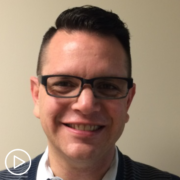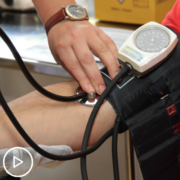A CAR T-Cell Therapy Care Partner Shares Her Story
A CAR T-Cell Therapy Care Partner Shares Her Story from Patient Empowerment Network on Vimeo.
What can patients and care partners expect when undergoing CAR T-cell therapy? Care partner Adrienne shares her husband’s experience with CAR T-cell therapy and explains her role as his care partner, while expert Sarah Meissner shares insights.
Sarah Meissner, RN, BSN, BMTCN, is a Blood and Marrow Transplant and Related Donor Search Coordinator at the Colorado Blood Cancer Institute. Adrienne is a Care Partner to her husband, who underwent CAR T-cell therapy.
See More from The Care Partner Toolkit: CAR T-Cell Therapy
Related Resources:

|

|

Why Is a Care Partner Essential for Patients Undergoing CAR T-Cell Therapy? |
Transcript:
Katherine:
Adrienne, I’d like to turn to now to you and find out more about your experience. How did all of this begin for you and your husband?
Adrienne:
This all began with my husband and I, we both are very active, and we work out a lot. And he had some pain in his lower back and his groin area.
And we started going to physical therapy and a chiropractor. And the chiropractor was doing besides just chiropractic, he also did physical therapy stuff, too. His pain wasn’t getting any better. And after a few months, he called to get an MRI and that’s when they found his myeloma was in the MRI. Because of his age, he was diagnosed in 2018 at I’m trying to think how old he was. He was around 37. So, it was a very early diagnosis maybe, but he definitely was on the young side of having this kind of cancer. So, that’s how we found out.
And then after that, it was just kind of a whirlwind on how we would get care for him and what we needed to do to get him better.
Katherine:
Yeah. It must have been hard.
Adrienne:
Yeah. It was hard.
Katherine:
What was the process like for you as his main care partner?
Adrienne:
My role once he was diagnosed was just to do everything I could to find out. We didn’t really know about the disease before. So, to find out what the best care for him was. We did a lot of research. We ended up going to several doctors before deciding what treatment plan we were going to go with.
And then, he had some ups and downs, some failed treatments. And that’s where we went into CAR T, because we had so many failed treatments before.
Katherine:
Did you feel like you were doing a lot of research? Were you doing a lot of homework Googling stuff?
Adrienne:
Well, kind of trying to but we were also told not to do that too much, because it’s always the worst-case scenario online. But we did that somewhat and we got as much information from each institute we went to. And we went to, like I said, we went through three, and then we ended up at CBCI at the end where we are now.
So, we started to discover that the first few lines of treatment were pretty standard. When you’re put into a situation where you find out your spouse has cancer, all you want to do is you want to find the magic miracle that’s going to cure them. And we did have to just go through the steps of standard care first. And we’re hoping that this CAR T-cell works. It’s working really well right now.
Katherine:
I was just going to ask you, how are you and your husband doing now?
Adrienne:
We’re doing pretty good. He’s still very tired. He’s, actually, taking a nap right now. And he has ups and downs. He definitely feels a lot better overall. He is getting back to normal life. But there are times where he just doesn’t feel quite right and has some physical pain and some cognitive issues.
And we don’t really know if that’s from CAR T alone or if it’s also just from the last five years of having chemo and bone marrow transplant and all of the care before the CAR T-cell.
Katherine:
Sarah, can you answer that question about cognitive difficulties that Adrienne’s husband is having?
Sarah Meissner:
Yeah. So, it is pretty common to have what we call chemo brain after any treatment really. And in the case of Adrienne’s husband, he’s had several rounds of chemotherapy going into the CAR T treatment. So, it can be kind of an accumulative effect of all of that. And it is something that people struggle with post-treatment.
It’s kind of a brain fog, not remembering things. So, working with the team and neurologists can be helpful in some cases. So, that is something that we see.










